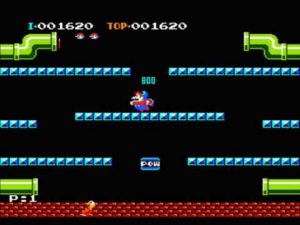(ThyBlackMan.com) When it comes to video game franchises, Nintendo tends to be the company that heavily protects its properties. A Nintendo game will take so long coming out that sometimes I will forget they were working on the game. Or it won’t be announced until it’s near completion. I like that approach, really—and that’s from someone who is critical on Bethesda taking its time getting around to Elder Scrolls VI. Let’s look at Nintendo’s five greatest and most well protected franchises of all time.
Super Mario – Franchise Debut: Mario Bros. (1983)
Super Mario is Nintendo’s franchise player, it’s the ace, the most important main eventer on Nintendo’s franchise roster. The franchise has many accolades and has done a lot for gaming worldwide and even saved the American gaming industry after Atari nearly suplexed it to death with games of increasingly questionable quality.
It showed that a franchise could improve with technology and even be spun out into different areas. There was a Nintendo cereal during the late 1980s (which I remember eating but couldn’t tell you how it tasted), three cartoons in a two-year period (which were dope), a film (which was bad), and merchandise (including a cool lunch box I had as a kid in kindergarten).
Not only did Super Mario become a media and merchandise machine, it also spun out into other genres of games. With the exception of the educational games, Super Mario delivered a good-at-minimum title each time. The franchise was also a jumping off point for advancing in gaming technology such as the analog stick on the Nintendo 64 which fully made use of 3D graphics by allowing you to move the camera and explore the world more.
It seems like a minor innovation but imagine playing a game like Tomb Raider without analog sticks. I did it as the original Dualshock controller for the first PlayStation didn’t come with them. At the time it wasn’t bad until you notice the difference when playing Super Mario 64.
It’s the most heavily protected franchise Nintendo has and the most flexible.
Pokemon – Franchise Debut: Pokemon Red/Green (1996)
In the same way that Super Mario was a thing in the 1980s and into the 1990s, the later part of the 1990s and early 2000s were dominated by Pokemon. Nintendo-affliated company Game Freak turned around a game that was inspired by a childhood hobby—bug collecting—into a franchise that generated billions of dollars. And they did it primarily on the handheld side.
Honestly, without Pokemon, Nintendo probably would’ve had a harder fight with Sony’s PlayStation Portable and PS Vita handhelds. If Pokemon drops, Nintendo prints money. Games will be sold and some people buy game devices just for those games alone.
It’s not just from the games themselves but the series has spun out into a TV series, a collectible card game, a beloved game that showed anime could do well in Western theaters, and other merchandise. Like Super Mario, it also spun off into other game genres and had roughly the same rate of success. Most games did good-at-minimum while a few were acquired tastes. In short, Pokemon is a beast of a franchise.
Super Smash Bros. – Franchise Debut: Super Smash Bros. (1999)
Of the franchises mentioned here, Super Smash Bros. is the youngest here. The concept isn’t particularly “Wow”-worthy: take your first party franchises and put them in a fighting game on your console. Boom. That’s it. It was important for Nintendo to do this since it wasn’t really getting any love from Midway, Capcom, or SNK to slide some fighting games their way for the Nintendo 64.
What happened was one of the most loved fighting game franchises and the only one that is a first party title. The Super Smash Bros. franchise is a Nintendo game through and through. This isn’t something that is like “Edgier Nintendo X Fighter” or anything like that.
Over the years, Super Smash Bros. has only grown, adding even more characters to play with. It’s even including character from franchises that haven’t been on a Nintendo console in decades. Also Smash competitions tend to be extremely fun to watch. It has its own culture in the fighting game community and depending on the game, there are different circles with the franchise’s fanbase.
Zelda – Franchise Debut: The Legend of Zelda (1986)
If Super Mario and Pokemon are in the top two spots, Zelda is a floater. It’s an important franchise for Nintendo and one of those early games that really pushed the company’s success in gaming but it’s not the media franchise that those two are.
What Zelda has always delivered on is great art and world creation for whatever period it was released in and strong gameplay. As is the case with Super Mario, there are examples of three games which didn’t live up to this—the three CD-I games. Those were horrible which is odd since 1993-1994 weren’t bad for Nintendo.
The failure of the Legend of Zelda brand on Philip’s CD-I console could probably be a reason why Nintendo is much more protective of its properties. Of Nintendo’s franchises, the Zelda games have been the titles that really showed what their consoles could do.
I won’t say they’re the only games that push Nintendo consoles to their limits but they’ve always been beautiful games with ridiculously tight gameplay that showed “You can do this with this hardware. This is how it’s meant to be use to its greatest potential.”
Metroid – Franchise Debut: Metroid (1986)
So, Metroid is a thing. In the West, Nintendo fans really rock with this franchise and we’re constantly waiting for a new Metroid. I don’t want to say it’s a running joke within the Nintendo fandom but waiting on Metroid is pretty much what we do.
That isn’t to say that Nintendo rarely makes games in the franchise but you’re more likely to get a remake than actual new game to continue the story. Also, Metroid is really the only franchise that actively continues the story from game to game. You don’t get that in the main Super Mario games or the Zelda games. It’s a different adventure with a lot of the same characters each time but Metroid builds upon the story.
That could be one reason fans enjoy the franchise. Of these franchises, this is one Nintendo will be flexible with in regards to letting other studios work on games for it—with close supervision.
Staff Writer; M. Swift
This talented writer is also a podcast host, and comic book fan who loves all things old school. One may also find him on Twitter at; metalswift.
















Leave a Reply